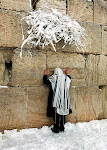24 Elul 5768
Very few of us appreciate the power of prayer. Let's schmooze about it for a moment.
Our relationship with tefillah is very similar to our relationship with one of those schnorrers on the streets of Meah Shearim – most of us pass right by, too busy to notice. Some of us stop, annoyed, and pull a few agurot from our pockets. Very few of us take out even a shekel, and even fewer of us take the time to say “Hatzlacha Rabbah,” or to even show a true sense of concern.
The reason we don’t show enough concern with our tefillos is because we don’t understand how powerful they are. Shimon HaTzaddik tells us in פרקי אבות א:ב that the world exists for three things – תורה, עבודה, וגמילות חסדים. Nowadays, we do not have עבודה (i.e. the sacrifices in the Beis HaMikdash). What is the substitute? So the gemara tells us in Brachos that our tefillos are substitutes for עבודה in Beis HaMikdash. They literally keep the world going.
Now, that’s very fluffy. Does that mean if you sleep through Shacharis the world is going to disappear, and it’ll be your fault? Well, maybe. And if that happens I’ll be the first to track you down in the next world and punch you in the face. But let’s talk about something that speaks to us.
There’s a very famous פסוק in Chumash, when Yaakov appears before Yitzchak wearing sheepskins on his arms, pretending to be עשו. The פסוק tells us that Yitzchak, in his confusion, said: הקול קול יעקב והידים ידי עשו.
That, say Chazal, was not just some off-the-cuff comment that Yitzchak made. Those words tell us how we can impact the world. Those words tell us what our weapons are when we go out to battle – literally and figuratively. We spoke about our weapons to fight the Yetzer Hara – tefillah is our weapon in every other realm of life.
What does prayer do? I used to think that prayer was for Hashem – we were blessing Him when we said “Baruch Atah Hashem.” Little did I know that this is what people call heresy (apikorsus). If we have to bless Hashem, that means He is less than infinite – He can gain from us. Which is ridiculous – He is all-powerful, all-worldly – he does not need our blessings. So if prayer does not impact Him, who does it impact?
Clearly the answer is us. We have what to gain from prayer. Prayer increases our awareness that we are dependant upon Hashem for everything. But where does that get us? So we recognize what Hashem does in this world. What does that do for us? That’s going to make us a better warrior? That’s going to improve my income the following year? That's going to make my relative feel better?
The answer is: YES. The רמבן at the end of בא writes that the whole purpose of creation is to: a) know Hashem runs the world, and b) to thank Him for it. So when we internalize that Hashem runs every single aspect of our lives, we grow closer to that goal. We become better people. More of our actions are performed לשם שמים. When more of our actions are performed לשם שמים, we become holier. When we become holier, Hashem is more likely to answer our tefillos in a more immediate fashion, even if they are the straight, generic nineteen ברכות of שמונה עשרה.
There many stories throughout תנ"ך that demonstrate this perfectly. One of this is the following: when בנ"י encountered עמלק right after they left מצרים, what happened? Moshe went up on the mountain to pray, and the פסוק tells us that whenever his hands were lifted in prayer, בנ"י were victorious. Whenever his hands became heavy and fell back down, עמלק started winning. What in the world does that mean? Some קישוף, some hocus pocus? So רש"י there brings down the גמ' in ר"ה – I wonder why this גמ' is there – that says that whenever בנ"י would look towards Shamayim, they would realize that Hashem runs the world, and they would start winning. Whenever they looked away from Shamayim, i.e. they started relying on their own “might,” they started losing.
This is what tefillah does, this is how it helps us. This is how we can use the tefillos on Rosh HaShana – they’re long, no doubt – but we can use them to our advantage. They can impact us, and when Hashem sees that we’re trying, He will give us siyata d’shmaya, and guide us along His path.
הצלחה רבה!
Subscribe to:
Post Comments (Atom)

No comments:
Post a Comment